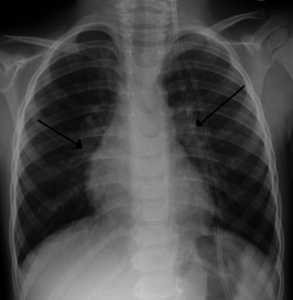
Before we reach our third birthday, nearly everybody in the world will have been infected by a virus called respiratory syncytial virus or RSV but most people haven’t even heard of it.
While usually symptomless, a minority (2%) of cases in infants and newborn babies are associated with severe disease. One paper recently even tried to put hard numbers to this issue and estimated that in 2015 there were just over 33 million cases globally, ten percent of those resulted in hospital admissions yet unfortunately 30,000 RSV deaths still occurred. With supportive care and the help of a some preventative therapies, RSV is treatable in the resource-rich settings, but not so across the developing world.
Unusually, infection with RSV induces no lasting immunity – once you’ve cleared the infection, there’s nothing stopping an identical virus from re-infecting you. Contrast this with a virus like measles. Most children are vaccinated against measles in the first few years of life. This vaccine is remarkably effective and can protect against probably every different ‘kind’ of measles virus out there. It’s unclear why RSV should be any different. If we understood why then we might have a shot at making a safe and effective vaccine and saving the 30,000 deaths every year.
In the accompanying podcast interview, Professor Jürgen Schwarze of the University of Edinburgh, a researcher interested in the important issue of RSV immunology, outlines the different thinking on how RSV avoids our immune system. He explains that one likely theory is that the virus can tip the immune system from a ‘Th1 response’ (which mostly targets intracellular bacteria and parasites – and viruses by producing antimicrobial signalling molecules like interferon gamma) to a Th2 response (which mostly targets extracellular bacteria and parasites by making certain kinds of antibodies).
While at present, there is no vaccine or specific treatment for RSV infections fascinating research carried out by Schwarze and colleagues suggests that gut infection with helminths (a kind of parasitic worm) can mitigate the damage done by RSV all the way in the lung. This worm protection against RSV disease also associated with the bacteria living in the gut that could stimulate the the bodies’ own natural antiviral defences called interferons to block RSV in the airways and reduce inflammation. Professor Swcharze doesn’t encourage purposeful parasitic infection to defend yourself against lung infections, once we understand the precise mechanism by which worms and bacteria in the gut control viruses in the lungs then hopefully new, carefully designed drugs could be developed to mimic such biology that could help the fight against RSV across the world, including resource poor settings where the burden is the highest.
Researchers at the CVR are also studying RSV and other respiratory infections such as influenza viruses. Groups such as the Murcia group along side structural biologists in the Bhella group and Hutchinson group. The hope is that by understanding the basic biology and epidemiology of RSV and related viruses we can better design ways to control this deadly disease.
The blog post and podcast was authored by CVR PhD student Jack Hirst and postdoc Dr Connor Bamford.

